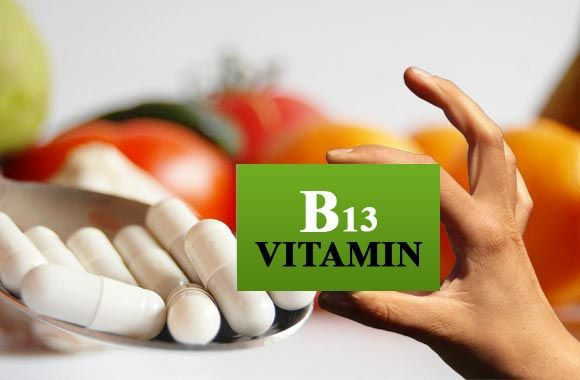Vitamin B13 is present in many metabolic cycles of the body, but few people understand and know about this vitamin. Let’s learn and explore more about vitamin B13 and its effects on human health.
Vitamin B13 is one of the members of the B vitamins. Recently, vitamin B13 has attracted the attention of the scientific and medical community because of its potential and role in human health care. Understanding vitamin B13 is very important and necessary for us to be able to care for and protect our health. Let’s learn and explore more about vitamin B13 through the article below.
Structure and properties of vitamin B13
Vitamin B13, also known as orotic acid, is an organic substance with a relatively complex structure found in nature. The chemical structure of vitamin B13 consists of a carboxylic acid group and a pyrimidine group, creating a multifunctional molecule that can interact with biochemical reactions in the body. Thanks to this structure, vitamin B13 is water-soluble and can be easily absorbed through the digestive tract.
Vitamin B13 is often extracted from colostrum, in Greek “oros” means colostrum. This vitamin is involved in the synthesis of phospholipids, nucleic acids and bilirubin – important processes in the body.

Vitamin B13 is essential for the body
Chemically, vitamin B13 or orotic acid, also known as 4-carboxy uracil acid or 2,6-deoxy pyridin-4-carboxylic acid, usually exists as a white crystal with a melting point of about 345 – 346°C and a molecular weight of 156.1 auC. Orotic acid is insoluble in other acids but can dissolve in alkali and hot water and form salts with metals. Physically, vitamin B13 has the ability to absorb ultraviolet rays quite effectively.
Although vitamin B13 is not one of the most common vitamins, its special properties and effects have made vitamin B13 an important component in the metabolism and development of the body. Understanding the structure and properties of vitamin B13 is the basis and necessary premise for us to explore more deeply its role in overall human health.
Effects and roles of Vitamin B13 on health
Although the effects of vitamin B13 are still a topic of research, some effects and roles have been mentioned in preliminary studies on this vitamin. Vitamin B13 is believed to play an important role in the metabolism of nutrients, supporting the development and maintenance of the functions of organs and systems in the body.
During metabolism, vitamin B13 exists in the form of light organic salts that are easily soluble in water, making it easy to absorb from the intestines into the blood. From there, it is transported to the liver and other organs in the body.
In addition, vitamin B13 – orotic acid also stimulates protein metabolism, improves liver function, reduces the risk of fatty liver, reduces blood cholesterol levels and has a positive effect on human reproductive function and growth. That is why vitamin B13 is researched and applied in the treatment of many diseases related to the liver, bile ducts, heart, blood vessels and muscles.

Vitamin B13 helps to strengthen and protect health
Vitamin B13 also has the ability to stimulate the process of blood formation including red blood cells and white blood cells. Biologically, vitamin B13 will be closely linked to nucleic acid metabolism, thereby having a positive effect on serum and blood cell formation.
At the same time, vitamin B13 also has a positive effect on protein synthesis and liver function. It helps improve liver condition by increasing the synthesis of the amino acid methionine, promoting the metabolism of folic acid and pantothenic acid, and also supporting fetal development. Orotic acid, a form of vitamin B13, is also used in the treatment and prevention of the negative effects of obesity.
Like other B vitamins, vitamin B13 also helps improve metabolism, support the digestive system and maintain energy balance in the body. During normal metabolism, vitamin B13 is an important factor for the synthesis of folic acid and pantothenic acid in the body.
Many studies have also shown that Vitamin B13 can have positive effects on heart health, sleep quality and support brain function. However, more research is needed to better understand how vitamin B13 affects health and its effects in the human body.
What foods contain vitamin B13?
The body’s daily requirement for vitamin B13 can range from 0.5 to 1.5 mg depending on the individual’s physical condition. Maintaining an adequate supply of vitamin B13 is essential for our overall health and well-being.
Although vitamin B13 is not as common as many other vitamins, it is still found in some natural food sources. Some natural foods that are quite rich in vitamin B13 include meat, fish, eggs, nuts and some vegetables such as carrots, beets, potatoes, onions and garlic. These are all familiar, easy-to-find food sources that help provide the body with vitamin B13 very effectively.

Vitamin B13 is found in a variety of foods.
In addition, sources rich in orotic acid – a form of vitamin B13 including extracts from mushrooms, animal liver as well as sheep’s milk and cow’s milk are also very effective sources of vitamin B13. Therefore, to supplement vitamin B13 for the body, you can consume foods such as mushrooms, liver, milk, yogurt and cheese.
Things to know when using vitamin B13
Before using vitamin B13, you need to be very careful and pay attention to the following issues:
- Side effects: When using vitamin B13, users may experience some side effects such as allergies and body irritation, but these cases are usually quite rare. However, you absolutely must not be subjective, if there are any unusual signs after using vitamin B13, quickly go to medical facilities for doctors to examine and intervene in timely treatment.
- Pregnant or breastfeeding women should not use vitamin B13 on their own and should follow their doctor’s allergy instructions.
- Never take vitamin B13 supplements on your own if you have a history of allergy to this vitamin.
- Never take vitamin B13 supplements without a doctor’s prescription if you are taking other medications, including prescription and non-prescription drugs, herbs and dietary supplements.
- Children or the elderly should not take vitamin B13 supplements on their own and should consult their doctors before use.

Consult your doctor before taking vitamin B13 supplements.
To best care for and protect your health and that of your loved ones, before using vitamin B13 or any other medication, you should discuss thoroughly with your doctor. This also helps us to minimize the negative consequences that may occur when using vitamin B13 incorrectly.
Vitamin B13 plays an important role in the body’s metabolism and development. Although this vitamin is not as popular as some other vitamins, its role in human health is undeniable. Researching and understanding more about the origin, effects and effective use of Vitamin B13 is extremely important and necessary so that we can best care for and protect our overall health.





